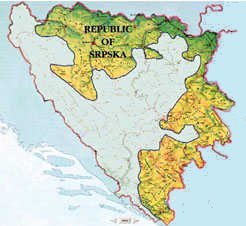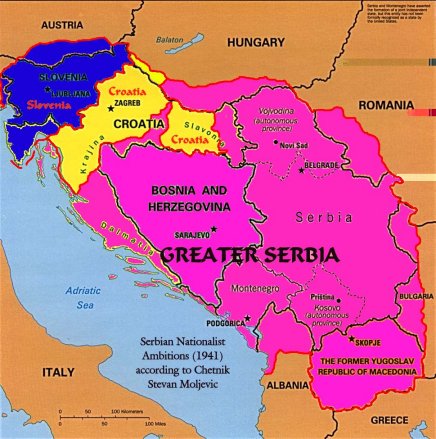Nationalism, at least in its extreme form, is not unique to Serbia by any means. What makes it different from other forms of nationalism in Europe is:
- 1. It is closely tied to a religious belief, Serbian Orthodox Christianity; and
- 2. It has never been moderated by participation in a wider community of nations such as the European Union.
There is nothing wrong with patriotism and there is nothing wrong with the Serbian Orthodox Church as two separate entities. It is when religion (whether it be Christianity, Islam, Buddhism or even Atheism for that matter) and nationalism become combined that a spirit of intolerance and fanaticism is born. From the Bible we see how the demise of the Kingdom of Judah was sealed by its combination of religion and nationalism.
Nationalism, combined with religious fervour, is dangerous because the boundary between the two becomes indistinguishable. It is said, with some justification, that "nationalism is the last redoubt of a bounder", meaning that all those who have lost the moral battle invariably turn to a nationalistic or an internationalistic banner. The Protestant Bombers of Northern Ireland hide behind the Union Jack of Great Britain and the IRA Bombers behind the flag of the Irish Republic. The extreme Russian party of Zhirinovsky hides behind the Russian Tricolour as do the Neo-nazis of America behind the Stars and Stripes.
I personally have nothing against Serbia and as a Christian I am more than happy to co-exist with the Serbian Orthodox Church. But I must say I have no truck with a combined Serbian nationalism-Christian Orthodox Church.
 Serbian nationalism is old. The Serbs once had a great empire which was destroyed finally by Turkish Moslem invaders. Like many countries occupied by the Ottomans, such a Romania, Bulgaria and Hungary, the Ottomans killed alot of people and forcibly converted Christians by the sword to accept Islam. The Balkans have never forgotten this trauma, something Westerners find difficult to understand. They were fighting for the very survival of their culure and religion. And they still are. They know, from their own bitter experience, what persecution and oppression are, more so than the West. I heard many stories when I visited Bulgaria in 1994 and will never forget them. The Serbs are much misunderstood and maligned. Yet they have also behaved in a manner that more resembles the Middle Ages than the late 20th century. They have got to learn to leave the brutalities of the past behind.
Serbian nationalism is old. The Serbs once had a great empire which was destroyed finally by Turkish Moslem invaders. Like many countries occupied by the Ottomans, such a Romania, Bulgaria and Hungary, the Ottomans killed alot of people and forcibly converted Christians by the sword to accept Islam. The Balkans have never forgotten this trauma, something Westerners find difficult to understand. They were fighting for the very survival of their culure and religion. And they still are. They know, from their own bitter experience, what persecution and oppression are, more so than the West. I heard many stories when I visited Bulgaria in 1994 and will never forget them. The Serbs are much misunderstood and maligned. Yet they have also behaved in a manner that more resembles the Middle Ages than the late 20th century. They have got to learn to leave the brutalities of the past behind.

Europe has experienced violent population shifts throughout its history. In recent times we remember the Germans of Eastern Germany, expelled in their millions by the Russian, Poles, and Czechs after the second world war, and the Greeks expelled from their former Asian lands in Turkey at the end of the first world war. The Serbs are accutely conscious of the need to survive and this may in part explain the terrible genocidal acts that have taken place since 1990 in the former Yugoslav territory. It's desire to have a cohensive national border with an exclusively Serb population is understandable if hard to sympathise with - it was the same pressure that led the Poles to expell their German minority after 1945. This perceived need has, however, not only meant the repression of non-Serbs, but also outrageous demands such as is illustrated in the map above, drawn up in 1941 by a Chetnik (Royalist) Serb. Were Serb ambitions (which have not changed) allowed to materialise they would start eating up chunks of Italy, Austria, Hungary, Romania, Bulgaria, Albania and Croatia as well as totally swallowing up Monte Negro, Bosnia and and Macedonia.
As New Covenant Christians we are in somewhat of a dilemma because we see the good and evil on both sides of the NATO/Serbian conflict. In the short term the Serbian régime is the greater of the two evils; in the long-term, NATO is. What is needed is the removal of Slobodan Milosovic as soon as possible as he is the chief agent provocateur. It's the same dilemma with Saddam Hussein - one man, and a few cronies, are holding a nation to ransom.
The Russian element isn't helping either because the Yugoslav crisis is exciting Russian nationalism sentiments and promoting the same kind of religious-nationalist feelings. The other day the President of Belarus visited Serbia and was told by Milosovic that Serbia wished to join the Slavic-Orthodox Christian Union between Russia and Belarus. Such a Union is, to say the least, extremely dangerous, and would place an unstable and still militarily powerful Russia back in the centre stage of Europe. Not that it's really needed anyway - a treaty exists between Russia and Yugoslavia which states that if Yugoslavia is attacked Russia will come to her aid. So far Russia has not done so. Thus the request to be a part of the Slavic-Orthodox Union is, I think, more of a political gesture than anything else.
There are many forces operating in the Balkans with people unwisely (mostly because they are uninformed by the media) "taking sides". Springmeier's article, with my own comments, is worth serious study.
The time before the First World War was sometimes called the "Great Game". European nations entered into secret alliances which had the effect of destabilising the continent and paving the way for great carnage. As then, the New World Order, lead by the Illuminati and others, are keen to see a major war to destabilise existing social structures and political institutions so as to effect a New Age coup d'état. Springmeier is wise is pointing out that modern Russia is not unlike the unstable period in Germany between the wars - the Weimar Republic - which led ultimately to the rise of nazism.
There was much optimism when the Iron Curtain fell and communist Europe began turning democratic. Naïve and stupid Western leaders, who have never learned the lessons of history, began talking of a Golden Age of peace and understanding. Amidst the euphoria of that time the New Covenant Church of God received a revelation indicating that the demise of the Soviet Union was but the prelude to a new fascism:
"There shall be a season of peace and righteousness, and the good that is in these [East European] nations shall grow and flourish, yea, as quickly as the evil. And the good shall be in the ascendancy for a while, and be a light, until the beast from the bottomless pit ariseth and crusheth it. Yea, the gentile flame of righteousness will roar for a while, and lighten everything, but shall be snuffed out as quickly as it riseth, as when a fire roareth under the blast of the billows and dieth down again" (OB 158:3-5).
Russia never really ceased to be a dictatorship after the "official" fall of communism, as other revelations also testify (OB 467) which has led some New Covenant Christians to speculate that the "fatal blow" given to the "beast" (mentioned in the Book of Revelation), which then came alive again, might not refer to Russian Communism/Fascism (the two sides of the same coin). It's certainly a possibility.
For now, we can only observe what is happening in the Balkans with some trepidation, as this was where World War I began, and over essentially the same problem areas (Bosnia) and people (Serb Pan-Slav Nationalism aided and abetted by Russia). I have two hopes: (1) That the Balkan Powder-Keg will die down; and (2) The NWO ambitions for a United States of Europe and eventually of the Word, will be halted long enough to get the Gospel Message out and all the saints gathered. There will be a world conflagration, no doubt (whether there will be one or two more world wars is not clear - I think one will be enough!), but I do not think it will happen tomorrow. We must pray for more time.
Laget: 15. april, 1999
Oppdatert: 15. april, 1999

Copyright © 1987-2008
Guds Nye Pakts Kirke
Yahwehs B'rit Chadashah Forsamling


